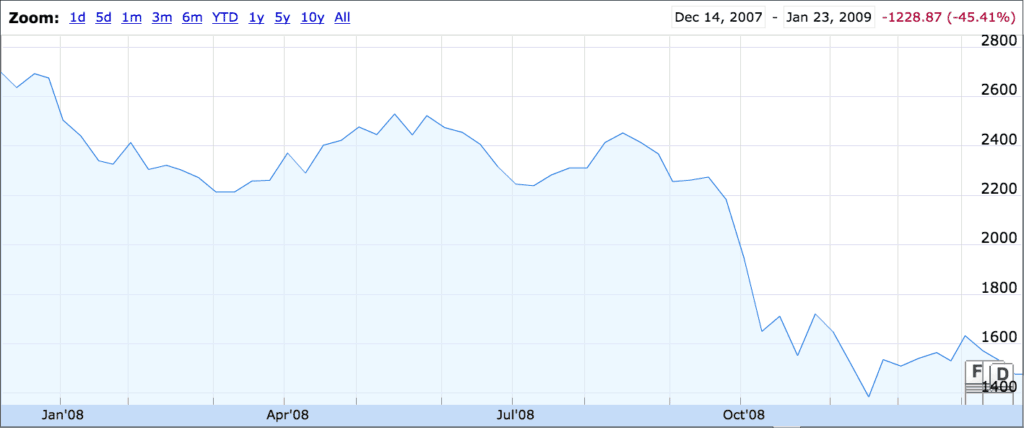Back in 2005, my mom passed away. During the next year, I went through a bunch of different major life events: managing an estate (albeit small), cleaning out my childhood home, fixing it up, selling it, buying a new house, began dating a woman who would eventually become my wife, and moving in together — all while working my first job out of college. I’m convinced that every 5-7 years, there’s a major change in my life, and that was the big one for that timeframe.

By 2007, the estate process was complete, I inherited some funds and I’d brought & sold a house. The end result of all that was that I had a shiny new home with $50k in equity and $250,000 in cash in my name. I was free of credit card debt and student loans, and in an amazing place to be a millionaire before I turned 30 — if things went well. After the stressful last few years, things were finally starting to look up.
Enter 2008
At the end of 2008, the stock market lost about 50% of its value. That $250,000 I had invested took quite a hit. By the end of the year, it was worth closer to $150,000. At the time, I had some portion of my portfolio in bonds, which went up at the time. This was also before I started managing my own investments, and my financial advisor had recommended putting a small amount into a “reverse ETF” — one that went up when the stock market went down. All this to say that I didn’t quite lose half my portfolio, but it was still pretty bleak.

The $300,000 house I’d purchased also lost half its value. In the span of a year, I went from having a net worth of $300,000 to $50,000.
What I Did Differently During the Recession
In January 2009, I opened an account at Vanguard with $5,000. Throughout 2009, I’d continue putting as much money into this account as I could — saving roughly 40% of my income at the time. This was an amazing time to do this. Even though I’d lost a ton of money, the money I put in during this year paid off about as much as 25% of my entire inheritance.
In 2010 I continued doing the same thing — investing new money in Vanguard funds while letting my other funds be managed by a financial advisor. By the end of 2010, I had 2 full years of experience investing by myself. I’d bought funds, sold funds and filed taxes and in that time built up the confidence to handle it all on my own.
At the beginning of 2011, I left the financial advisor and moved everything over to Vanguard. By the end of 2011, I was back to $250,000 in the account — after 2 years.
What Would I Do Differently?
If I had a crystal ball at the time, there’s a lot I would do differently. But even thinking about it now, there’s very little I would change. The biggest one surrounds home ownership and the idea of buying (and keeping) a home during a bubble. I mentioned this and some other related pitfalls I’ve fallen into in my lifestyle inflation post.
One other thing would be not adapting to legislation that came out around short-sales — which offered the opportunity to sell while underwater with lower repercussions. We were happy where we were though, so the only incentive to sell would be to take advantage of this.
Lastly, I wish I had saved even more! Savings rate is one of the biggest levers of control, and investing during a downturn can result in a return on investment rarely seen otherwise.
Takeaways for Next Time
The biggest realization I had during this time was how much value there is in having a diversified portfolio. While major indexes lost 50% of more of their value, I’d lost less than 40%. The major factor in that was diversification into bonds for part of it. Even today, bonds are not paying off in amazing amounts, but in the event of another 2008, I’ll be amazing glad I had them. 2008 helped me understand my risk tolerance by stress testing it at the worst time.
Going through a financial stress is character building event. What you do due to it is the important factor. This is a common theme in The Obstacle Is the Way — putting a focus on what you can control and not dwelling on the past or what you can’t control.
For anyone else who had investments back in 2008 — what would you do differently? What did you learn from investing during that time period?
Mike and Sophie, The Money Sloths
July 19, 2017
Hi Adam, we love your blog and we enjoyed this post. Do you have a twitter handle? We’d like to tweet this blog post.
Adam
July 19, 2017
Thanks Mike & Sophie! Yeah, that’d be a good one for me to include somewhere. I’m @minafiblog on Twitter. https://twitter.com/minafiblog
Super Frugal Duo
July 20, 2017
Hey Adam, thanks for sharing. I was too young to be investing or buying houses during the Great Recession, but I spend a fair amount of time trying to learn about it, reflect, and think, “What would I have done then?” to prepare for the future. We’re actually in the middle of writing a three-part series on buying houses defensively, largely in response to someone I spoke with who had a very different experience from yours around 2007-2010. It’s reassuring to see some of the lessons I’ve gleaned after the fact are similar to those you share here, as someone who actually went through it.